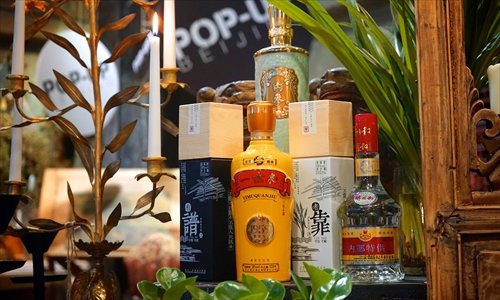
Baijiu enthusiasts and flavor developers are finding another side of baijiu with baijiu infused cocktails, teas and coffees. (Photo/Courtesy of POP-UP BEIJING)
For most foreigners who live in China, drinking baijiu (Chinese white liquor) and doing ganbei (bottoms up) is unavoidable, especially in the presence of senior colleagues and friends - no Chinese celebration or business deal is complete without a toast with some baijiu.
Nick Van Leeuwen, a 28-year-old Australian, who has been living in China for five years, is no exception. His most memorable ganbei experience was drinking a homemade baijiu in Henan Province.
"The baijiu was very strong. You could feel it going down your throat and into your stomach. I guess its alcohol level was around 70 to 80 percent; you could light a fire with it," said Van Leeuwen. He got drunk after several ganbei toasts.
Baijiu is the most consumed spirit on the planet by sales volume, with 1.14, 1.16 and 1.17 billion 9L cases consumed in 2011, 2012 and 2013 respectively, according to the 2014 International Wine and Spirits Record report.
Many foreigners in China are familiar with the baijiu ganbei culture. Some of them, like Van Leeuwen, think the culture of toasting with white liquor and emptying your glass on each toast is an interesting way of breaking the ice and getting to know people more. Others either don't like the taste or have bad experiences with the drink and keep their distance from it. Meanwhile, many foreigners outside of China have almost never heard of it.
To better promote baijiu around the world, some foreigners in China, fans of Chinese baijiu, have come up with some novel ideas to increase local and international knowledge about the liquor.
World Baijiu Day, which falls on August 9 and will be celebrated in 25 places around the world this year, is one of those efforts. A pre-celebration event was held on Saturday at POP-UP BEIJING. Having enjoyed the inaugural staging last year, Van Leeuwen also attended Saturday's event.
"I am looking forward to trying baijiu tea and baijiu coffee," he said. "[Last year,] I tried Chinese baijiu with a cocktail and baijiu with pizza. To my surprise, they taste good when they are combined," he said.
A small group of foreign baijiu lovers, owners of local bars and foreign white liquor companies in other countries, is trying to find new ways to increase baijiu culture around the world by lowering its alcohol level, adding new ingredients, tweaking its brewing method and re-conceptualizing its packaging.
World Baijiu Day
"Smell first then sip it," said Jim Boyce, the World Baijiu Day organizer, as he explained the contents of each tass of baijiu to dozens of spirit lovers at the pre-celebration event.
A Canadian wine expert and wine blogger based in Beijing, Boyce has two main goals for the event this year. First, he wants to give more people a chance to try baijiu, and second, he wants to go "beyond ganbei" to show the potential for baijiu pairing with cocktails, foods, coffee, chocolate, liqueurs and more. Both Chinese and foreigners alike can enjoy baijiu infusions such as baijiu tea, baijiu coffee and taste white liquor from other countries, he said.
A total of 25 cities, including Beijing, New York, London and Sydney, will participate in this year's event, an increase over 2015.
"The event last year was successful, and many bars and restaurants wanted to do the event again," Boyce said.
Compared with last year, the trend of adding new elements to the Chinese baijiu culture is increasing. Attendees have a wealth of baijiu to choose from: Chinese traditional baijiu, American baijiu, New Zealand baijiu and many mixtures and pairings to sample.
For example, more beer mixtures have been added this year. "When people make baijiu, they use qu (a distiller's yeast used in the production of most Chinese alcoholic beverages) to make sugar become alcohol. This year, some beer makers are using baijiu's qu to make beer as a new product," said Boyce.


















































